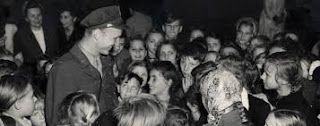Operation Santa Claus – A Forgotten Moment in History
Nowadays, "Operation Santa Claus" is associated with a USPS program to match letters to Santa with donors of gifts for kids. During the Russian blockade of Berlin 1948-1949, the children of Berlin didn't dream of writing to Santa Claus. The situation was too grim.
Santa came anyways.
December 1948 was a bleak time for the children of Berlin. The city was under siege. No food, clothing, medicines or coal could reach the city by land and everything from flour and milk to toilet paper and detergent had to be flown in on the small propeller planes of the day. The coal to run the power plants, factories and heat the ovens of the city also had to be flown in, as did diesel, gasoline and kerosene to run busses, lorries and cooking, lighting and heating.
As a result, public transport worked just twelve hours a day, and there was no gasoline or diesel to run private vehicles. The civilian population received electricity just two hours out of every twenty-four -- and sometimes that allocation (which rotated by section of the city) came in the middle of the night. Coal for heating ovens was so scarce that as the temperatures fell, people froze in their own homes and apartments.
Food was rationed, too, and much of it was dehydrated -- powdered eggs, powdered milk, powdered butter, powdered soup, powdered potatoes. As Christmas approached the Berliners made jokes about the Allies flying in Christmas trees -- powdered! (Just add water!) Instead of powdered Christmas trees, the Allies flew is candy, chocolate, gum and Christmas presents for kids.
Yet the most astonishing aspect of this "Operation Santa Claus" was that it was a private initiative undertaken initially by some of the Allied airmen themselves. Seeing the condition of the children and realizing just how bleak their lives were, Allied participants in Airlift started writing home and asking their friends, relatives and churches to send presents for the children of Berlin.
Their pleas did not fall on deaf ears. By early December some ten thousand Christmas parcels had been sent to the Allied bases in Western Germany for delivery to Berlin. The USAF organized Christmas parties at which these gifts could be distributed to Berlin children.Although the British had far less to share and many items (including bread!) were still rationed in Great Britain, the personnel at RAF Gatow also organized two Christmas dinners for children on 25 and 26 December 1948. One participant recalls:
They hadn't seen so much food in years. They looked very thin and pale. We also gave up our chocolate rations. And at the end of each party they had a present and best of all an orange. Yes, an orange. Our food was pretty lousy, but we did our best for those kids." [Norman Hurst, RAF Operations Clerk, RAF Gatow, in a letter to the author 5 December 2005.]
The Russians had counted on "General Winter" stopping the Airlift just as "he" had stopped Napoleon and Hitler. General Winter was supposed to make the conditions in Berlin so unbearable that the Berliners would turn to the Russians, embracing Soviet rule for the sake of more food, heat and light. Instead, "General Winter" defected to the West by being mild, and the ordinary Americans and British working on the Airlift delivered the coup de grace to Russian ambition by winning the hearts of German children (and their parents) with chocolate, oranges and Christmas presents.
The Berlin Airlift is the subject of Bridge to Tomorrow, a trilogy of novels starting with Cold Peace and continuing with Cold War.
Watch a video teaser here: Winning a War with Milk, Coal and Chocolate
The first battle of the Cold War is about to begin....
Berlin 1948. In the ruins of
Hitler’s capital, former RAF officers, a woman pilot, and the victim of Russian
brutality form an air ambulance company. But the West is on a collision course
with Stalin’s aggression and Berlin is about to become a flashpoint. World War
Three is only a misstep away. Buy Now
Berlin is under siege. More than two million civilians must be supplied by air -- or surrender to Stalin's oppression.
USAF Captain J.B. Baronowsky and RAF Flight
Lieutenant Kit Moran once risked their lives to drop high explosives on Berlin.
They are about to deliver milk, flour and children’s shoes instead. Meanwhile,
two women pilots are flying an air ambulance that carries malnourished and
abandoned children to freedom in the West. Until General Winter deploys on the
side of Russia. Buy now!
Based on historical events, award-winning and best-selling novelist Helena P. Schrader delivers an insightful, exciting and moving tale about how former enemies became friends in the face of Russian aggression — and how close the Berlin Airlift came to failing.










Comments
Post a Comment